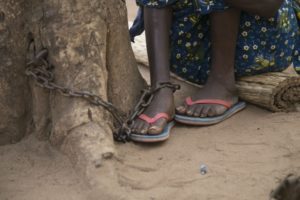In West Africa, as is the case in many other parts of the world, mental illness carries a stigma, and may even be perceived as a family curse passed down across generations. Mental illness, including psychosis, paranoia and other conditions, are like chains, as some families shackle their loved ones as slaves as a last resort, in a region where psychiatry is not present.
Reporting for the New York Times, Benedict Carey explores two approaches of dealing with mental illness in West Africa, including nonprofits and other groups providing therapy and drugs without doctors or clinics, and prayer camps, where people are chained as workers and ask God to cast out the evil spirits believed to make those with mental illness sick. While neither approach provides a holistic approach to mental health and wellness—there is a hope that those who are impacted will find relief in some way.
In Africa and Asia, in the absence of psychiatry, a growing number of community based groups are providing therapy through mobile nurses, community support systems and cheap generic drugs, in an attempt to reach millions of impoverished people who are in need. Trained nurses diagnose and prescribe drugs and in some cases provide talk therapy, while other efforts provide group therapy to rape victims, and health workers who are not doctors treat those suffering from depression and trauma. There is skepticism, however, as to the effectiveness of such approaches, in the absence of follow up, reliable support and medical supplies.
While deadly infectious diseases such as HIV, malaria and measles have been the focus of global health officials in Africa and elsewhere, mental illness has not been a priority. However, the United Nations recently made its first commitment to “promote mental health and well-being.” The international body has pledged to cut premature deaths due to mental illness by a third by 2030. In 2007, a series by The Lancet medical journal predicted that the cost burden of mental illness will surpass heart disease, cancer and all other noncommunicable diseases, while depression, drug abuse and schizophrenia will become the leading causes of lost economic output by 2030. In West Africa, Sierra Leone has no psychiatrists and Liberia has one, according to the New York Times, while Niger has three, Togo four and Benin seven.
Meanwhile, in West Africa, religious retreats known as prayer camps set up psychiatric wards that use only prayer. Typically, family members, faith healers or prayer groups will shackle loved ones out of sight, resulting in unreliable data on exactly how many people in West Africa living with mental illness are kept in chains. However, it is estimated that there are at least 1 million people with schizophrenia in nations such as Nigeria, Togo and Ghana, where chaining is common.
In the West, prison is a repository for the mentally ill, including 100,000 prisoners in the U.S. alone. In parts of Asia such as Indonesia, cages, shackles and stocks are widely used. This practice of chaining people against their will violates the UN disability rights convention. In West Africa, the practice is motivated by the belief that God can heal anything, including schizophrenia and psychosis. People with the illness are perceived to be possessed by demons or practicing witchcraft.



